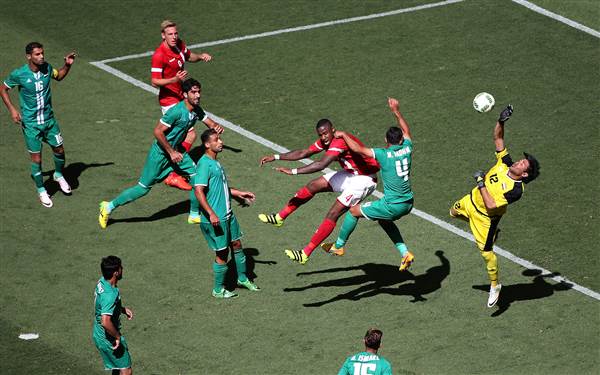Iraq’s National Soccer Team Aims to Prove to ISIS ‘That Nothing Can Divide Us’

BAGHDAD — Iraq's national soccer team played its first game on home soil in years on Thursday, beating Jordan 1-0 in Basra, a city that suffered some of the worst violence after Saddam Hussein's reign of terror.
The match drew 60,000 fans — and everything went smoothly.
But the match was about much more than sports. It was widely seen as a sign that the country is moving beyond the conflict and bloodshed that has plagued it since the U.S. invasion of 2003.
"We are proving that that nothing can divide us," said Dhia Salem, 27, a Baghdad barber. Salem made the five-hour drive south to Basra to catch a game that he predicted would "unite all Iraqis, especially after defeating ISIS who were betting on dividing Iraqis."
This is an important message in a country whose forces, backed by the U.S.-led coalition, are fighting to drive out ISIS. The hyper-violent Sunni extremists preach a version of Islam that's intolerant of other sects and religions.
With forces closing in on the militants' last Iraqi stronghold of Mosul, world soccer officials have given the country its first chance to host an international match in four years.
For many Iraqis, the ethnically and religiously mixed team is living, breathing proof that ISIS' philosophy has no place in the country.
"The Iraqi team represents all Iraqis. It doesn't represent Sunnis or Shiites, neither Arabs, Kurds, Muslims nor Christians," Salem said. "I do not care about the sect of any player, since he is playing for Iraq."
Basra is in Iraq's southern Shiite heartland. It witnessed vicious fighting in the aftermath of the U.S. invasion, and militias besieged British soldiers in their bases in 2008.
It has been largely spared from ISIS, but as Iraq struggled to combat the group in other parts of the country, security forces have been redeployed from the south, leaving a security vacuum that has been filled by unruly militias and criminal gangs.
An intense security operation was mobilized to protect the 60,000 fans, many of whom have fond memories of when the Iraqi national team beat Saudi Arabia in the final of the 2007 Asian Cup, sending thousands joyfully spilling into the streets.
"Winning that tournament suddenly brought all Iraqis together," said Kamel Zugheir, a spokesman for the Iraqi Football Federation. "Those people ... celebrated as Iraqis, not as Sunnis or Shiites. They sent a message to officials that it is easy to bring all Iraqis to stand side by side as it was easy to create problems among them."
Those celebrations came after decades of political and sporting isolation. Iraq's national team wasn't allowed to play at home from 1980 to 2003, when the country was at war with neighboring Iran and then was under international economic sanctions.
World soccer officials extended the ban after the U.S. invasion removed Saddam from power and triggered chaos and then a civil war.
However, games in the northern and relatively safe Kurdish city of Erbil were allowed.
Since 2009, Iraq was given two chances to show that it could host international matches, but violence that once again swept the country in recent years meant international officials pulled permission once more.
The drama surrounding Iraq's national team has played out against the country's greater national tragedy.
Since the fall of Saddam, about 3 million Iraqis have been displaced by violence, and according to the International Organization for Migration.
It isn't known how many Iraqis were killed in the eight years after the U.S. invasion, although estimates have put the number between 112,000 and around 500,000.
Soccer fan Mahmood Abed, 18, who sells sunglasses on the streets of Baghdad, could only dream of watching his national team play in person.
"I was raised among a family that used to go to watch the Iraqi team in Iraqi stadiums," Abed told NBC News. "My father always recalls those memories and tells me about what a wonderful feeling it was to watch your team playing in front of you."
He was age 8 at the outbreak of the civil war, which was driven by divisions between Sunni and Shiite Muslims.
Nevertheless, Abed said, he doesn't make any religious distinction among his countrymen. And that feeling led directly to his love of soccer.
"When I watch a match in the TV for our national team, I do not ask if this player or that is a Sunni or a Shiite," he said. "I only care about the results."